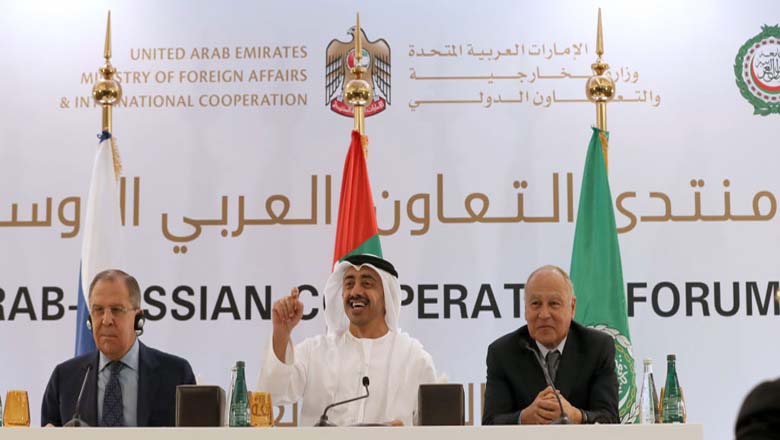
United Arab Emirates’ Foreign Minister Sheikh Abdullah bin Zayed al-Nahyan (R), Russian Foreign Minister Sergei Lavrov (L) and Arab League Secretary General Ahmed Aboul-Gheit (R) are seen during a press conference in Abu Dhabi on February 1, 2017. (KARIM SAHIB/AFP/Getty Images)
UAE foreign minister Abdullah bin Zayed said on Wednesday that President Donald Trump’s travel ban on 7 majority Muslim countries was an “internal affair” and not directed at any religion.
Trump’s executive order, titled “Protection Of The Nation From Foreign Terrorist Entry Into The United States,” bans nationals from Iran, Iraq, Libya, Somalia, Sudan, Syria and Yemen from entry into the United States for the next 90 days and coincides with a pause in the the admission of all refugees to the U.S. for the next four months.
The executive order has sparked protests around the world.
However, according to Reuters, while speaking at a joint news conference with Russian counterpart Sergei Lavrov in Abu Dhabi, Sheikh Abdullah said, “The United States has taken a decision that is within the American sovereign decision… There are attempts to give the impression that this decision is directed against a particular religion, but what proves this talk to be incorrect first is what the U.S. administration itself says… that this decision is not directed at a certain religion… If the aim behind these areas is humanitarian and temporary and under an international umbrella, I think this is a basis we can work on.”
Sheikh Abdullah added that a majority of Muslim countries were not included in the ban. According to the Pew Research Center in 2010, there were 49 Muslim-majority countries, making the ban affect about 14% of the world’s Muslim population.
Homeland Security officials claimed the same sentiments earlier Tuesday. At a news conference, Department of Homeland Security Secretary John Kelly said the order imposes a “temporary pause” as the government “assess the strengths and the weaknesses of our current system,” reports NPR. Kelly repeatedly stated that the ban was not on Muslims, but on certain countries.